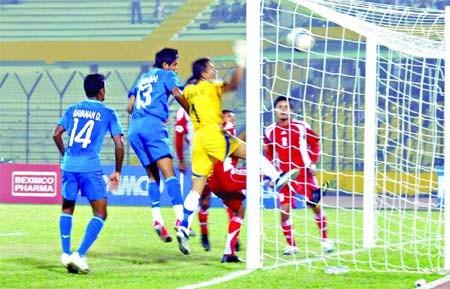INDIA
v
JAPAN
Huangpu Sports Centre, Guangzhou
16.11.2010
Indian Under-23 boys have so far defied odds to reach the knock-out rounds of Asian Games football. This is the first time since 1982 that India has managed to cross the hurdle of the group league. Credit must be given to the team for qualifying from a group, which was one of the toughest in the competition.
India started off with a disappointing 2-0 defeat to Kuwait. Though the midfield played well, the boys were let down by inexperience in defence and attack. The performance really took off against the defending goal-medalist Qatar. Ravanan led from the front, and India were one up till the 80th minute. India, one of the youngest teams in the competition, once again showed its lack of experience, shipping in two goals in the last ten minutes. So it all came down to the last group game against Singapore, against whom India needed to win by a good margin to secure qualification; and they did win it, with the score-line reading 4-1 in favour of South Asian champions.
The rout was started by Jewel Raja, perhaps the most impressive Indian player in these three games, who dispatched a free-kick into the back of the net. Balwant made up for missing good chances in first two games with a screamer from half-line. Jibon Singh and Manish Mathani rounded up the scoring for the men in blue. India qualified to the round of 16 by virtue of being the best placed team among the third placed ones.
India’s strong point till now has been the midfield. Jewel Raja has dictated terms in the midfield, while Jibon Singh has performed the role of the pit-bull terrier, winning possession. Their combination has been a bit like the combination of Andrea Pirlo and Rino Gattuso. Joachim Abranches has been leading from the front on the left wing. His free-kick set up India’s opening goal in this year’s Asiad. Manish Mathani scored India’s fourth goal against Singapore with a sweetly taken strike; he continues to improve with each passing game.
The defence has improved considerably after the first match. Ravanan has been a defensive rock, with Rowilson assisting him ably. Lalthalma missed the match against Singapore, but young Lalrozama played well in his stead. But the Indian defence conceded another late goal against Singapore; their goal-keeper Sandhu is a decent shot-stopper, but looks uncomfortable when dealing with crosses.
Despite Balwant scoring a stunning goal against Singapore, Indian strikers remain the Achilles’ heel of the team. In tight matches, India won’t be able to create too many chances; having wasteful strikers wont help in such games. Malasawmfela continues to be overlooked for reasons best known to the coach.
India’s opponents are one of the elites in Asian football, the young Blue Samurais of Japan. Japan was a minnow in Asian football till the 1980s. In the last 25 years, they have made improvements by leaps and bounds, and can be easily called as one of the powerhouses outside Europe and South America. Surprisingly, they have never won a gold in Asian Games; therefore, they will be pumped up the capture their maiden title. Winning the gold will be sweeter, as the Games are being in held in the backyard of Japan’s political rival, China.
Japan line-up for the match against China
Japan has sent their Under-21 team for the Asian Games. The team is coached by long time Kawasaki Frontale gaffer Takashi Sekizuka. Japan has a perfect record in the Games, having won all three of their group matches. Impressively, they won without conceding a single goal. They began with a 3-0 win over hosts China, followed by a 2-0 win over Malaysia. Having ensured qualification, the coach played a second string side against Turkmenistan, which Japan won 3-0.
Other than a water-tight defence, Japan’s hallmark has been well coordinated attacking surges. Six different players have scored Japan’s eight goals. Fukoka University player Kensuke Nagai has been one of their best strikers, with two goals in two matches. Kyohei Noborizato celebrated his birthday with a brace against Turkmenistan. Ryohei Yamazaki and Kazuya Yamamura will fight it out with Jewel – Jibon for controlling the midfield.
India has a 3-2 record against Japan in Asian Games. India won the first two encounters in 1954 (3-2) and in 1962 (2-0). Since then Japan has never lost to India in the Asiad, winning in 1966 (2-1), in 1970 (1-0) and in 1998 (1-0).
A lot will depend on the Indian forward line. If the strikers waste chances, as they have done so in last few games, then the Bhangra Boys will not be able to breach a well-organized Japanese defense. India has been playing with an indomitable spirit in Asian Games, and the boys have a decent chance of defeating the Japanese.
